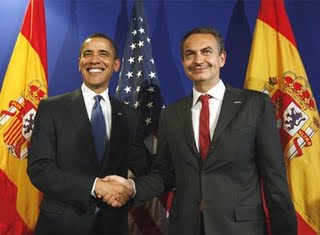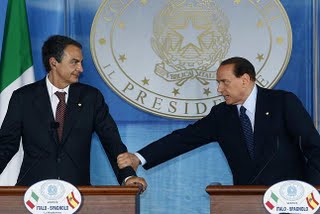The Spanish president, José Luis Rodríguez Zapatero, is due to arrive in New York later on today for a visit to the US. During his visit he will participate in the 64th session of the UN General Assembly in the UN headquarters in New York and he will also attend the G-20 summit which will be held in Pittsburgh (Pensylvania).
On Tuesday Zapatero will attend a high level meeting on climate change which has been called by the Secretary General of the UN, Ban Ki Moon, with the objective of preparing the way for a conference on climate change which is due to be held in Copenhagen in December aimed at achieving an international agreement on significantly reducing CO2 emissions.
Zapatero, who will take part in one of the round table discussions at the meeting is expected to emphasize the need to reach an agreement at the Copenhagen conference and will ask for gestures from both developed and developing economies in order to move towards a model of development which is more sustainable and respectful of the environment. According to government sources Zapatero will also urge the private sector to get involved in the fight against climate change.
On Wednesday Zapatero will attend the opening of the General Assembly debates in the UN headquarters and will give a press conference afterwards. In the afternoon he will attend the reception organized by Obama in the Metropolitan Museum of Art for the heads of states who have attended the UN debates.
On Thursday Zapatero will attend the first meeting of the ‘Group of Friends’ created in 2008 for a democratic Pakistan and in which Spain became involved in February this year. Following this Zapatero will take part in a debate in the UN General Assembly entitled: Strengthening Multilateralism and Dialogue between Civilizations.
According to government sources Zapatero will include subjects such as the fight against climate change, non proliferation and nuclear disarmament and the future Spanish presidency of the EU in his speech. Following this the Spanish president will travel to Pittsburgh, where the third meeting of the G-20 addressing the reform of the international financial system is due to begin.
Spain is expected to defend its commitment to imposing sanctions on banks which pay excessive bonuses to their directors and to making sure that banks follow anti-crisis measures together with fiscal plans aimed at stimulating the economy.
Zapatero will also take advantage of his US trip to hold bilateral meetings with other heads of state including meetings planned with the presidents of Mexico, Felipe Calderón; Argentina, Cristina Fernández de Kirchner; Corea, Lee Myung-bak, Canada, Stephen Harper and the recently elected prime minister of Japan, Yukio Hatoyama.
Zapatero’s intense international agenda will continue later on this month with his first tour of the Middle East during which he will visit Israel, Syria and the Palestinian Territories.
Zapatero is also due to attend a meeting with Obama in the White House on 13th October.
 The US president, Barack Obama, will visit Spain next year in May in order to attend a summit meeting between the EU and US. The meeting will take place on 24th and 25th May in Madrid during the Spanish presidency of the EU.
The US president, Barack Obama, will visit Spain next year in May in order to attend a summit meeting between the EU and US. The meeting will take place on 24th and 25th May in Madrid during the Spanish presidency of the EU.


